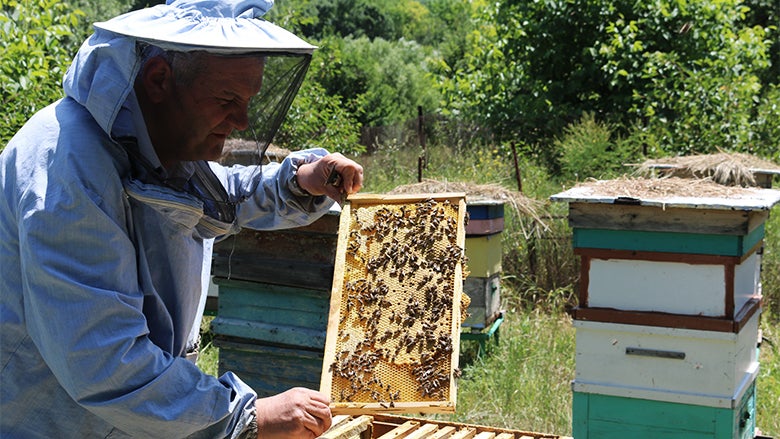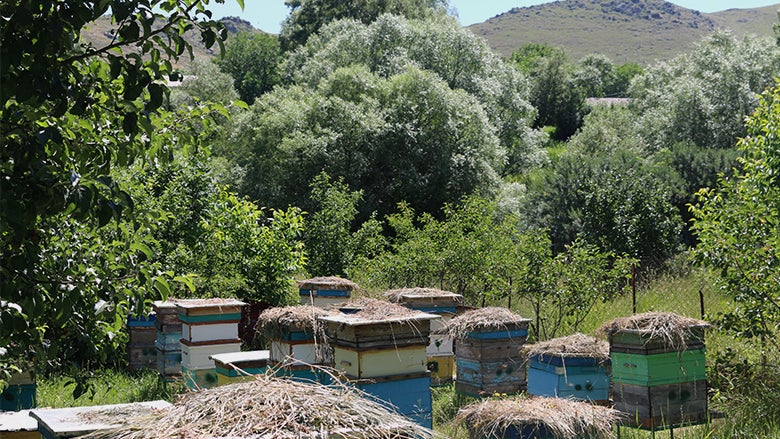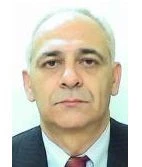
Lernapat, in Armenia’s northern Lori province, is a beautiful village situated in a mesmerizing mountainous area. Nothing beats the scenery around the little village, lost in the mountains. Here you are left with one thing – relaxation, brought on by breathing the fresh air.
Recently, I had the pleasure of visiting Aren Mirzababyan, a beekeeper who lives in Lernapat. Aren and I had talked on the phone several times but had also postponed our meeting several times, owing to bad weather. Now I was approaching his village.
Our car snaked up through a narrow pathway, in between bushes. Visibility was approaching zero when I noticed Aren’s silhouette. We had arrived at the last station behind the hill.
“This year did not favor us,” Aren began. “A drought was followed by a rainy season with low temperatures, especially at night. Nectar loves warmth – not hot, but at least 16 degrees (Celsius).”
Climate change is not a happy topic for any farmer - including beekeepers. It hurts severely. Some beekeepers have lost as much as 20 percent of their bees - a global phenomenon in which colonies of bees mysteriously disappear from their hives.
Chemicals, intensive land use, evolving viruses, and different environmental factors all threaten bees’ survival and lower their productivity.
“I was thinking of moving even closer to the mountains for the exceptional view and diverse flora, but it’s too risky. Plus, you see the telecom aerials. Bees are fond of peace and natural sounds, not technical ones,” continues Aren. “Honey isn’t free, beekeeping has a price – the hive, the equipment – but the true price is how hard the bees work when we humans let them work.”
I have always wanted to know Aren’s story. Why bees, after successfully graduating the faculty of Mechanics from Yerevan State University?
“I have a chronic disorder, an inflammation of my vertebrae, commonly known as Bekhterev’s disease,” Aren told me. “My doctor has no solution, just medicine to make my life less painful. For a while I was unable to turn my neck. Years ago, my father read in a book that a sting from a bee will help and cause remission. This is how bees entered my life. As of today, I’ve almost quit all medicine and my test results are good as well.”
“Bee stings in all cases, without any prescription,” laughs Aren.
Aren’s knowledge of the bee-world is encyclopedic, including citations from Egyptologist chronicles about the beloved food of pharaohs. But what he loves most is to sit peacefully next to the hives, among the bees, in the evenings. He soaks-up their sound, like a melody, and inhales the smell of nectar.

Precise in his words, Aren has achieved this balance in his life through hardship. His native city, Vanadzor, like many other soviet-era ‘flagship’ zones, had simply become an ‘industrial desert’ with astronomical rates of unemployment, with many once-prosperous people now descending into poverty.
He was on the verge of desperation when he suddenly got a wake-up call from Mission Armenia, a Yerevan-based NGO dedicated to community social and healthcare needs, within the Japanese Social Development Fund grant project managed by the World Bank.
There, he decided to take a computer class, despite thinking it might be a waste of time - and soon followed-up with a business class organized for vulnerable people in the Lori region. At the very least, it would be ‘therapy through socialization,’ thought Aren.
After just a few weeks, he was pleasantly surprised with the interesting and articulate participants and their devotion and willingness to learn. He was also impressed with the passion of the lecturers. These classes lasted for about five months and, in the end, Aren’s business proposal (naturally focused on beekeeping) received the highest score. Along with four other participants, he received a grant to start a business.
“None of us had ever seen or felt this much money in our hands. The temptation to spend was high,” he admits. But the courses taught him that one needs a vision of how to escape the poverty trap.
He bought a used car and the beehives, along with a 2000m2 plot of land, which he is very proud of - calling it his ‘residence’ from early spring to late fall.
His brother and sister-in-law would regularly visit him, and they gradually started to cultivate potatoes there. It soon grew into a small organic farm for family use. Their latest initiative is buying milk to produce cheese for the family.
Aren is convinced that the younger generation needs to see hard-working people around. He was so motivated that he drafted a letter to the then Prime Minister of Armenia about the importance of providing opportunities for empowerment and training for poor people. He strongly believes in the power of knowledge and skills.
“It was a miracle change. It was my chance and I made it. I bid farewell to poverty and will never allow myself to go back. I am not scared of tomorrow and it doesn’t matter how unfavorable the year might be, in terms of climate,” says Aren.
Last year he collected more than 800 kilograms of honey, but would be happy to get half as much this year. He strikes me as more worried for his clients than about his own earnings.
As we part, he reminds me: “Honey never spoils if is kept properly, like everything else in this life.”


Join the Conversation